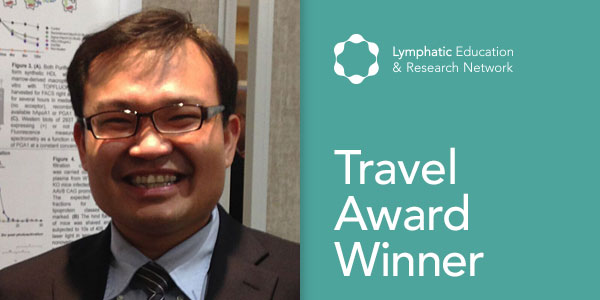Li-Hao “Paul” Huang, currently a postdoctoral scholar at Washington University in St. Louis School of Medicine, under the supervision of Dr. Gwen Randolph, received a travel award from LE&RN to attend the 2016 Gordon Research Conference (GRC) in Lymphatics held in Ventura, CA. We asked Paul to share his thoughts on that experience with us and to tell us a bit about his research and future plans.
What did you get out of the Conference? Why did you feel it was important to attend?
I would like to thank LE&RN for the travel award that supported my attendance at this conference. This meeting was fantastic because the research topics were incredibly diverse, yet interdisciplinary. The friendly environment provided a great opportunity for me to discuss frontier research with many leading scientists. Through these interactions at the conference, I was able to introduce my research and was able to receive significant constructive feedback. It was a great experience being part of this energetic community. Without a doubt, I felt that attending this conference was helpful and important for the advancement of my research projects.
What are your areas of interest in research?
Beginning from my Ph.D. studies, I developed an interest in studying how cholesterol homeostasis impacts atherosclerosis and obesity. Although the inverse relationship between HDL cholesterol levels and cardiovascular disease is well studied, a big question still remains unanswered: why a pharmacological increase in plasma HDL levels fails to provide clinical benefits? Is it possible that in addition to plasma HDL cholesterol levels, HDL trafficking through lymphatics is part of the critical process? I have a keen interest in investigating the relationship between lymphatics and lipoproteins, and my training in biochemistry and lipid biology comes together perfectly with the research directions provided by Dr. Gwen Randolph’s laboratory, currently expanding its focus to study lipoprotein trafficking.
What are your hopes and plans for your career and your research?
My ultimate goal for my postdoctoral training is to bridge the gap between HDL transport and lymphatic research. At present, so much is unknown in this area, and I am confident that my passion and my multidisciplinary training will bring a different perspective to the lymphatic field.
Why do you believe that, in general, lymphatic research is important? What might the field accomplish within the next few years?
Lymphatic research, an emerging field, potentially cross talks with many fields of science. Growing evidence demonstrates that lymphatics play a pivotal role in many diseases, including atherosclerosis. I believe that novel therapeutics to treat atherosclerosis can be developed in the near future after we better understand lymphatic biology.
